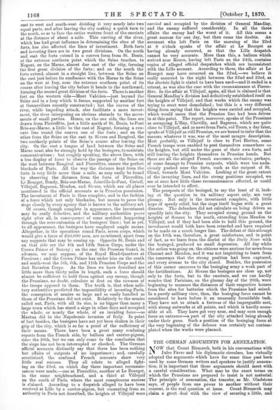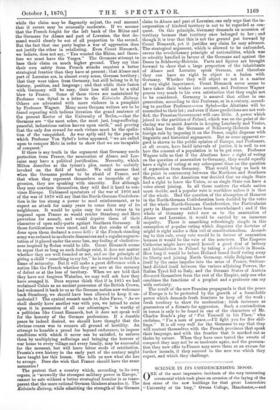THE GERMAN ARGUMENTS FOR ANNEXATION.
NOW that Count Bismarck, both in his conversations with Jules Fevre and his diplomatic circulars, has virtually adopted the arguments which have for some time past been used by some German writers and speakers to justify annexa- tion, it is important that those arguments should meet with a careful consideration. What may be the exact terms on which the Prussians are prepared to insist is not material. The principle of annexation, the transfer, as Mr. Gladstone says, of people from one power to another without their consent, is the real question at issue. Count Bismarck may claim a great deal with the view of securing a little, and while the claim may be flagrantly unjust, the real amount that it covers may be unusually moderate. If we assume that the French fought for the left bank of the Rhine and the Germans for Alsace and part of Lorraine, the first de- mand would clearly be out of all proportion to the second. But the fact that one party begins a war of aggression does not justify the other in retaliating. Even Count Bismarck, we believe, does not say, " You wanted the Rhine, and there- fore we must have the Vosges." The Germans attempt to base their claim on much higher ground. They say that their own safety from French attacks requires a better strategical frontier than they have at present ; that Alsace and part of Lorraine are, in almost every sense, German territory ; that they were taken from Germany, but still belong to it by history, position, and language ; and that while their fusion with Germany will be easy, their loss will not be a vital blow to France. Some of these views are maintained by Professor von Sybel in a letter to the KOlnische Zeitung. Others are advocated with more violence in a pamphlet by Professor Wagner. Many more German writers are to be found repeating with tedious iteration the grand sentence of the present Rector of the University of Berlin,—that the Germans are "the most sober, the most just, long-suffering, peaceful, industrious nation known upon earth," and proving that the only due reward for such virtues must be the spolia- tion of the vanquished. As was aptly said by the paper in which Professor Von Sybel's letter appeared, "we are called upon to conquer Metz in order to show that we are incapable of conquest."
If there is any truth in the argument that Germany needs protection from France, the annexation of Alsace and Lor- raine may have a political justification. Necessity, which Milton describes as the tyrant's plea, cannot be unfairly invoked on the field of battle. We will assume that when the Germans profess to be afraid of France, and that when they represent themselves as incapable of ag- gression, they are speaking with sincerity. But although they may convince themselves, they will find it hard to con- vince Europe. Unbiassed spectators of the war of 1866 and of the war of 1870 will say that the North-German Confedera- tion is far too strong a power to need reinforcement, or to expect an attack for many years to come from any of its neighbours. It would be quite easy for such terms to be imposed upon France as would render Strasburg and Metz powerless for assault, and would deprive them of their character of open sally-ports against Southern Germany. If those fortifications were razed, and the first stroke of work done upon them declared a cams belli ; if the French standing army was reduced to moderate dimensions and a regular augmen- tation of it placed under the same ban, any feeling of vindictive- ness inspired by Sedan would be idle. Count Bismarck seems to argue that so long as such feelings exist, it does not matter whether they are well founded or not, and on the principle of giving a child " something to cry for," he is resolved to feed the flame of animosity. But it will make a great difference with a nation like the French whether they are 'sore at the memory of defeat or at the loss of territory. When we are told that they have not forgiven Waterloo, we may well ask how they have avenged it. Does anyone think that if in 1815 we had reclaimed Calais as an ancient possession of the British Crown, had welcomed it back to us as the German nation now welcomes
back Strasburg, we should have been allowed to keep it un- molested ? The cynical remark made to Jules Fevre, " As we shall shortly have another war with yon, we intend to enter upon it in possession of all our advantages," is worthy of a politician like Count Bismarck, but it does not speak well for the honesty of the German professions. If a durable peace be indeed desired, we shoald have thought that the obvious course was to remove all ground of hostility. An attempt to humble a proud foe beyond endurance, to impose conditions with which it never can be satisfied, to enforce them by multiplying sufferings and bringing the horrors of war home to every village and every family, may be successful for the moment, but will leave bitter seeds of retribution. Prussia's own history in the early part of the century might have taught her this lesson. She tells us now what she has to avenge. Does she wish that France should have the same memories ?
The pretext that a country which, according to its own organs, is "avowedly the strongest military power in Europe,"
cannot be safe without a better strategical frontier is so trans- parent that the more rational German thinkers abandon it. The Kolnisehe Zeitung, while admitting the strength of the German
claim to Alsace and part of Lorraine, can only urge that the in- corporation of kindred territory is not to be regarded as con- quest. On this principle, Germany demands an accession of territory because that territory once belonged to her ; and though it is true that this is not the ground put forward by Count Bismarck, yet it justifies any claim he may advance. The strategical argument, which is allowed to be unfounded, covers the revolutionary principle of nationalities, which was so adroitly handled in favour of the Germans and against the Danes in Schleswig-Holstein. Facts and figures are brought forward to show that a large proportion of the inhabitants of Alsace and Lorraine speak German, and therefore they can have no right to object to a fusion witt. Germany. Whether they will object or not is a matter of very slight importance. Count Bismarck never seems to have taken their wishes into account, and Professor Wagner proves very much to his own satisfaction that they ought not to be considered. Germany is assured that either in one generation, according to this Professor, or in a century, accord- ing to another Professor—von Sybel—the Alsatians will be reconciled to their lot ; and even if these predictions are not veri- fied, the Prussian Government will care little. A power which joined in the partition of Poland, which was on the point of de- claring war to assist Austria in keeping Lombardy and Venice, which has freed the Germans of Schleswig-Holstein from a foreign rule by imposing it on the Danes, might dispense with linguistic and historical arguments. But as some apparent re- gard is shown to the public opinion of Europe, and Professors, at all events, have lucid intervals of justice, it is well to see how the consent of a population is to be got over. Professor Wagner tells us that if the Alsatians have a right of voting on the question of annexation to Germany, they would equally have a right of voting at any subsequent time on the question of separation from Germany. That would bring us back to the point in controversy between the Northern and Southern States, and as the American war decided that no single State had a right to leave the Union, so no single State can have a voice about joining. In all these matters the whole nation must decide, and a popular vote is worthless unless it is that of the whole. Had the question of the absorption of Hanover in the North-German Confederation been decided by the votes of the whole North-German Confederation, the Particularist party in Hanover would have been overwhelmed ; and if the whole of Germany voted now as to the annexation of Alsace and Lorraine, it would be carried by an immense majority. There is something refreshingly simple in this conception of popular voting which disguises the doctrine of might is right under a thin veil of constitutionalism. Accord- ing to this rule, every vote would be in favour of annexation because it would be the vote of the annexers. The Empress
Catherine might have spared herself a good deal of bribery and intimidation in Poland by taking a plebiscite in Russia.
How long it would be before Holland found itself voting away its liberty and joining North Germany, while Belgium threw itself by the same impulse into the arms- of France, Switzer- land divided itself between the various adjoining Powers, the Italian Tyrol fell to Italy, and the German States of Austria divorced themselves from the rest of the Empire, only one who combines the functions of a prophet and a professor can say with certainty.
The result of the new Prussian propaganda is that the peace of Europe is to be protected by the growth of a formidable power which demands fresh frontiers to keep off the weak ; fresh territory to -show its moderation ; fresh fortresses as guarantees of a distaste for aggression. Such a contradiction in terms is only to be found in one of the characters of Mr.
Charles Reade's play of "Put Yourself in his Place," who exclaims, " I'm a man of peace,—I'll fight you for five shil- lings." It is all very well for the Germans to say that they will content themselves with the French provinces that speak their language, and with the frontier that is marked out as theirs by nature. When they have once tasted the sweets of conquest they may not be so moderate again, and the provoca- tion they now offer to France may serve them as an excuse for further inroads, if they succeed in the new war which they expect, and which they challenge.































 Previous page
Previous page